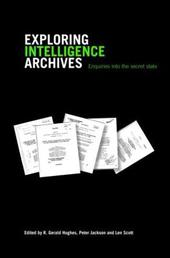
|
Exploring Intelligence Archives: Enquiries into the Secret State
Paperback
Main Details
| Title |
Exploring Intelligence Archives: Enquiries into the Secret State
|
| Authors and Contributors |
Edited by R. Gerald Hughes
|
|
Edited by Peter Jackson
|
|
Edited by Len Scott
|
| Series | Studies in Intelligence |
|---|
| Physical Properties |
| Format:Paperback | | Pages:352 | | Dimensions(mm): Height 234,Width 156 |
|
| ISBN/Barcode |
9780415349727
|
| Classifications | Dewey:320 |
|---|
| Audience | |
|---|
| Illustrations |
1 black & white halftones
|
|
Publishing Details |
| Publisher |
Taylor & Francis Ltd
|
| Imprint |
Routledge
|
| Publication Date |
1 October 2006 |
| Publication Country |
United Kingdom
|
Description
Scholars seeking to understand the role of secret intelligence in political affairs, and in the policy process, have sought to make use of relevant archives. Yet constraints on access to such sources have been considerable. With the end of the Cold War and other changes in official attitudes, more intelligence documents are now becoming available. This book present documents in the public domain that illustrate themes and issues in understanding the realm of intelligence. Some of these provide potentially important insights or information in the broader understanding of national and international security, as well as illuminating the cultural environment within which security and intelligence services operate. No document speaks entirely for itself, though some may be more eloquent or assertive than others. The interpretation of the archival record (as indeed the non-archival record) is at the heart of scholarship, and challenges in interpreting texts are generic problems for any researcher. One question is whether the nature of intelligence poses specific challenges for the historian. If deception, deceit and manipulation are integral to the business of intelligence gathering - what are the implications for the historical record? Are indeed intelligence archives themselves officially constructed to allow only manipulated histories? This book examines these questions and explores how various kinds of people involved in studying and/or practicing intelligence, view texts and issues from different perspectives.
Reviews'This volume is a welcome addition to the intelligence bookshelf, particularly for use in the university classroom. It is unique in three ways: firstly, in the range of topics that are covered; secondly, in the wide variety of established expertise it brings to bear on a range of primary sources; thirdly, and above all, in the unprecedented access it provides to hitherto unpublished archival material.' Dr Jennifer Siegel, Ohio State University 'An ideal introduction to the serious study of secret intelligence and the use made of it over the last century: well-chosen case studies with key documents and stimulating commentary. Essential reading for every intelligence studies course.' Prof. Christopher Andrew, Corpus Christi College, Cambridge
|